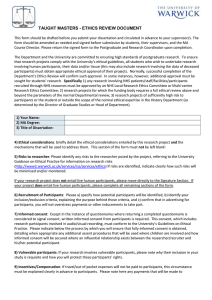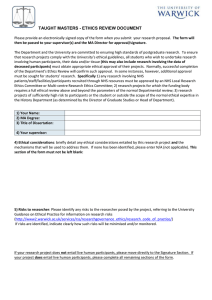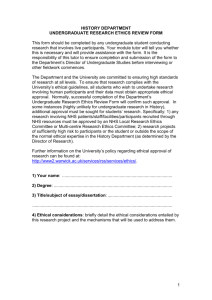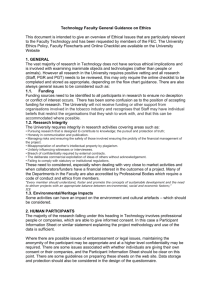MPhil/ PhD ethics document
advertisement
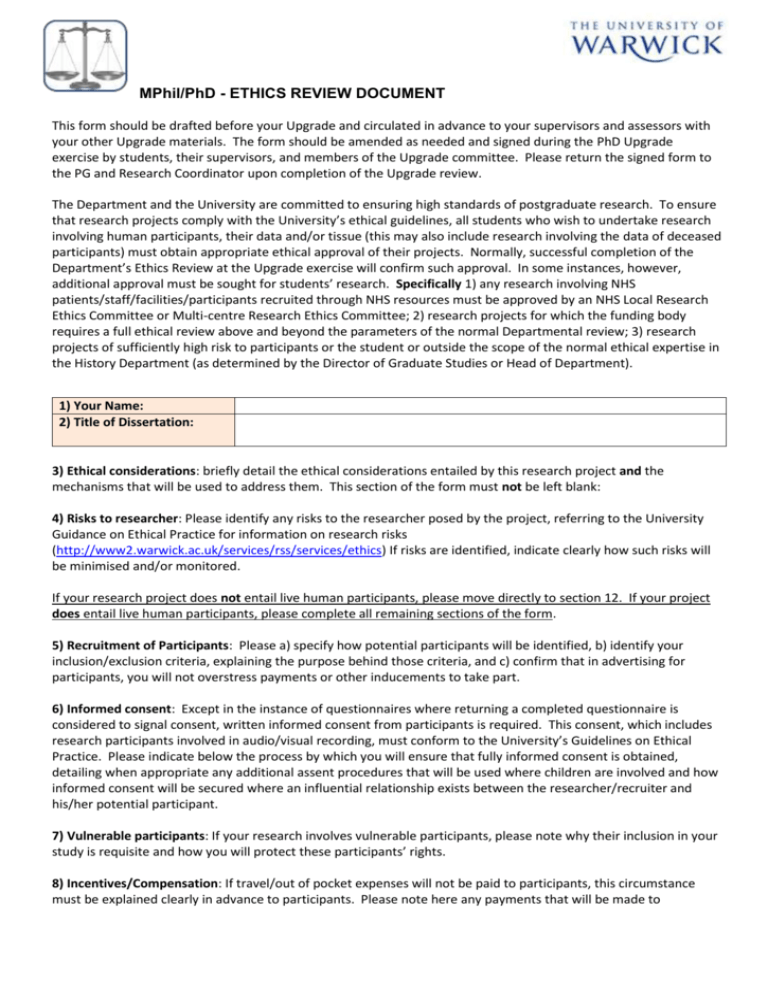
MPhil/PhD - ETHICS REVIEW DOCUMENT This form should be drafted before your Upgrade and circulated in advance to your supervisors and assessors with your other Upgrade materials. The form should be amended as needed and signed during the PhD Upgrade exercise by students, their supervisors, and members of the Upgrade committee. Please return the signed form to the PG and Research Coordinator upon completion of the Upgrade review. The Department and the University are committed to ensuring high standards of postgraduate research. To ensure that research projects comply with the University’s ethical guidelines, all students who wish to undertake research involving human participants, their data and/or tissue (this may also include research involving the data of deceased participants) must obtain appropriate ethical approval of their projects. Normally, successful completion of the Department’s Ethics Review at the Upgrade exercise will confirm such approval. In some instances, however, additional approval must be sought for students’ research. Specifically 1) any research involving NHS patients/staff/facilities/participants recruited through NHS resources must be approved by an NHS Local Research Ethics Committee or Multi-centre Research Ethics Committee; 2) research projects for which the funding body requires a full ethical review above and beyond the parameters of the normal Departmental review; 3) research projects of sufficiently high risk to participants or the student or outside the scope of the normal ethical expertise in the History Department (as determined by the Director of Graduate Studies or Head of Department). 1) Your Name: 2) Title of Dissertation: 3) Ethical considerations: briefly detail the ethical considerations entailed by this research project and the mechanisms that will be used to address them. This section of the form must not be left blank: 4) Risks to researcher: Please identify any risks to the researcher posed by the project, referring to the University Guidance on Ethical Practice for information on research risks (http://www2.warwick.ac.uk/services/rss/services/ethics) If risks are identified, indicate clearly how such risks will be minimised and/or monitored. If your research project does not entail live human participants, please move directly to section 12. If your project does entail live human participants, please complete all remaining sections of the form. 5) Recruitment of Participants: Please a) specify how potential participants will be identified, b) identify your inclusion/exclusion criteria, explaining the purpose behind those criteria, and c) confirm that in advertising for participants, you will not overstress payments or other inducements to take part. 6) Informed consent: Except in the instance of questionnaires where returning a completed questionnaire is considered to signal consent, written informed consent from participants is required. This consent, which includes research participants involved in audio/visual recording, must conform to the University’s Guidelines on Ethical Practice. Please indicate below the process by which you will ensure that fully informed consent is obtained, detailing when appropriate any additional assent procedures that will be used where children are involved and how informed consent will be secured where an influential relationship exists between the researcher/recruiter and his/her potential participant. 7) Vulnerable participants: If your research involves vulnerable participants, please note why their inclusion in your study is requisite and how you will protect these participants’ rights. 8) Incentives/Compensation: If travel/out of pocket expenses will not be paid to participants, this circumstance must be explained clearly in advance to participants. Please note here any payments that will be made to participants to reimburse for travel/out of pocket expenditure and fully justify any additional payments that will be made to participants. 9) Participant Benefit/risk: Please highlight any possible benefits to the participants and any potential harm/risks to participants that may ensue from participation in your study. Where potential risks/harm have been identified, please indicate what steps will be taken to minimise/monitor them. 10) Data protection: In accordance with the Data Protection Act, please specify how you will ensure the confidentiality of information that would identify particular participants, and what action may be taken should confidential information be discovered that would cause concern. 11) Data Storage: Please confirm that original data (including signed consent forms and copies of relevant documentation) will be kept in a secure location, accessible for inspection if required for at least 10 years after completion of your degree. 12) Overseas research travel: The department expects that students will inform the supervisors of the dates and itineraries of research travel. When appropriate, supervisors may ask students to complete the ‘risk assessment for overseas travel’ form. The department expects all students to obtain the requisite visas (including research visas), to consult and abide by the information in the relevant FCO pages regarding travel warnings and to comply with local laws. Upgrade Assessor Signature Upgrade Assessor Signature Supervisor/s Signature Supervisor/s Signature Student Signature: Date Date Date Date Date NB. Please return this form to the Postgraduate Co-ordinator, H340 following the interview. Graduate Programme in History The University of Warwick Coventry CV4 7AL United Kingdom Tel: 024 7652 3292 Fax: 024 7652 4451 Email: sarah.k.doughty@warwick.ac.uk Director: Prof David Anderson Email: d.m.anderson@warwick.ac.uk
